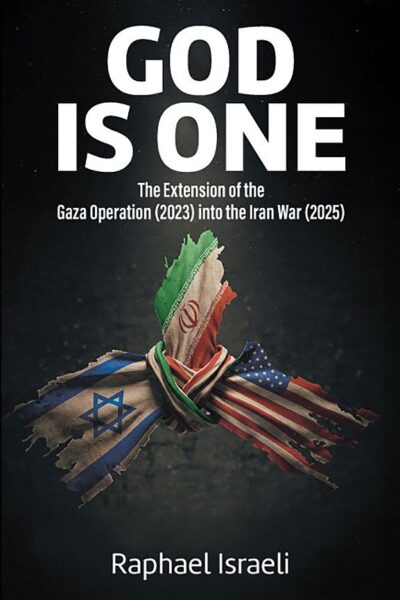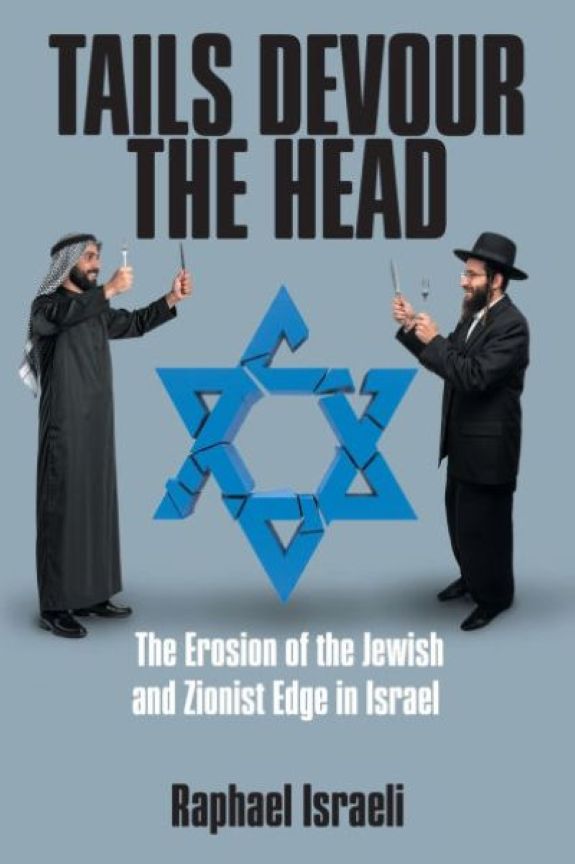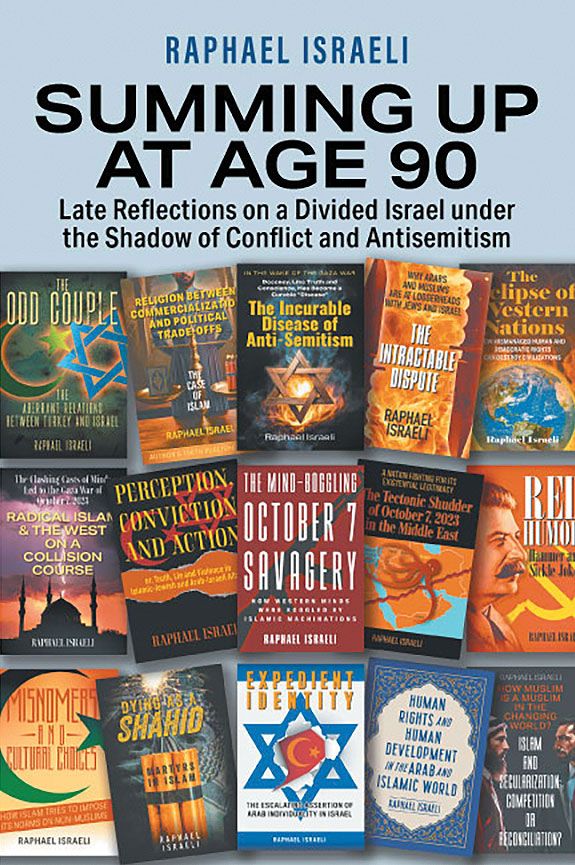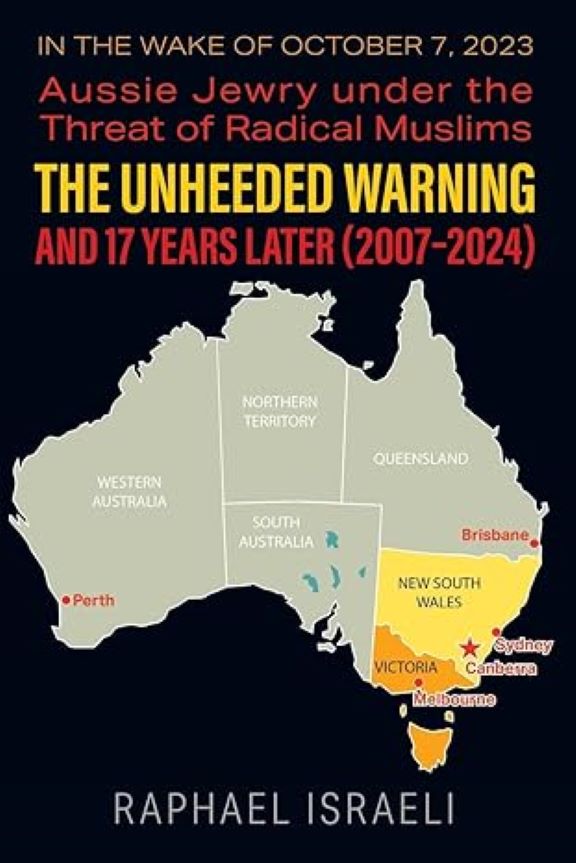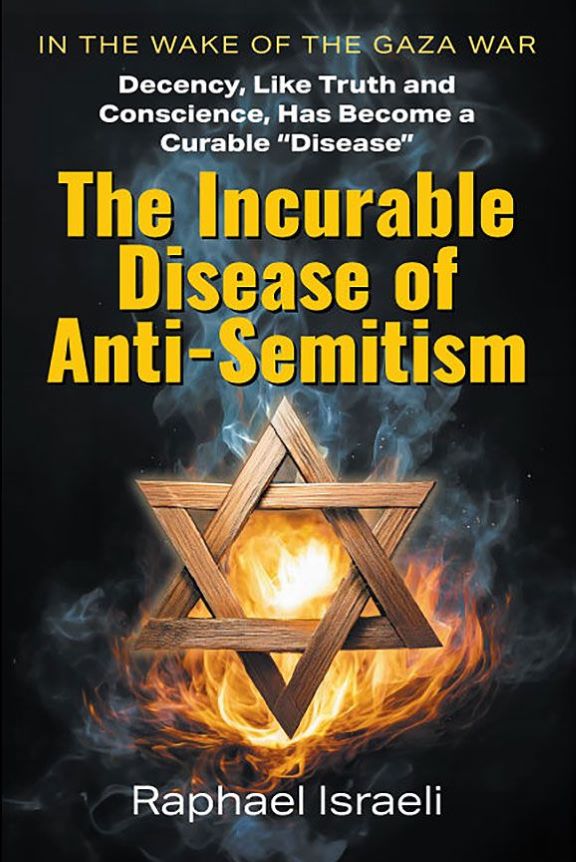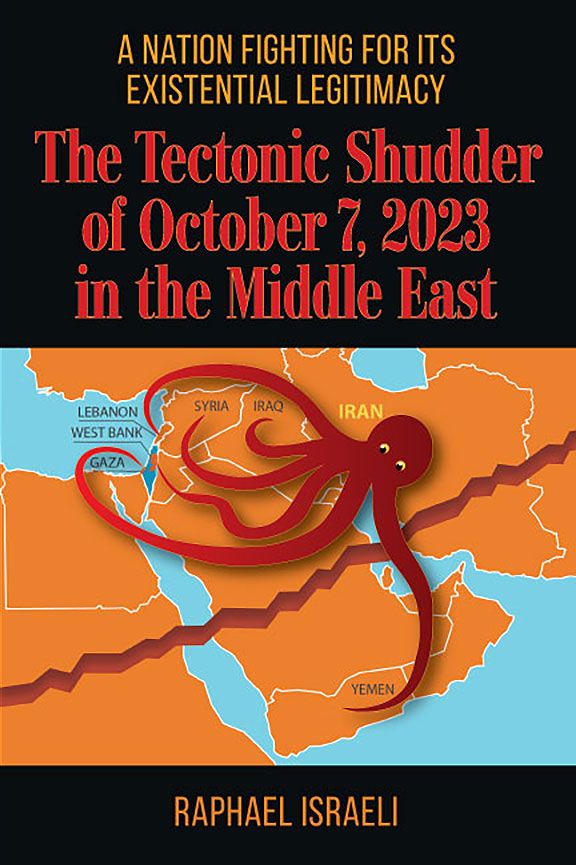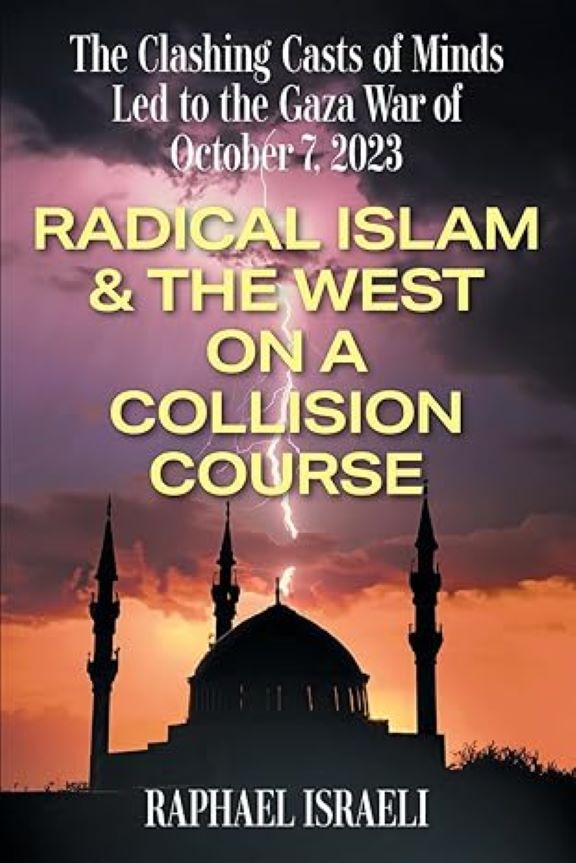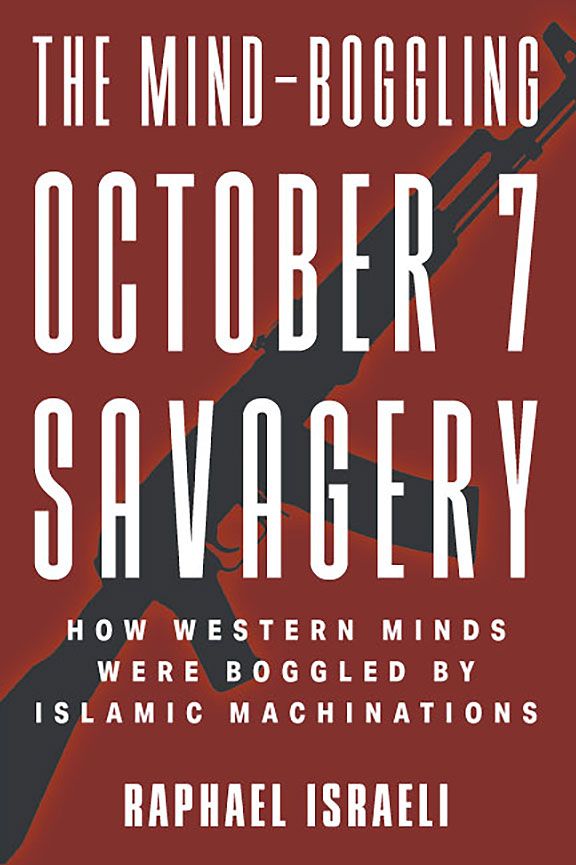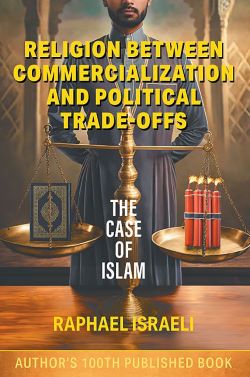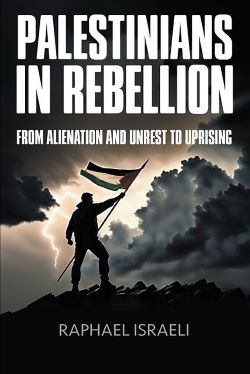
RAPHAEL ISRAELI


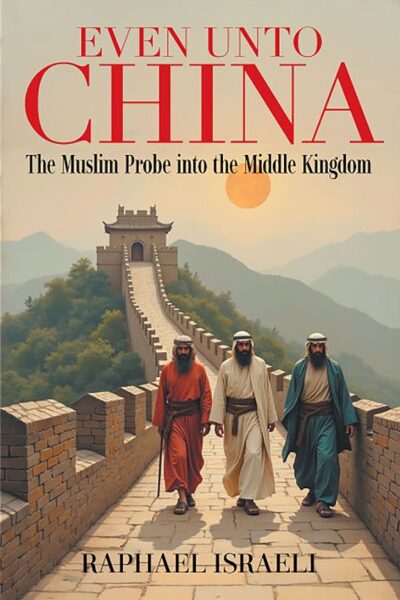

BOOKS

While Moderate Muslims Are Repenting, the West Is Capitulating to the Radicals
It was paradoxical that under President Trump, who was supposed to be belligerent and irreconcilable, a new avenue of understanding opened up with the Arab world, especially the Gulf States and Egypt. This relationship had gone awry under President Obama, who had started by prostrating himself before the Saudi King and speaking of accommodation and engagement with the Islamic world at Cairo University, but ended up supporting the Muslim Brother government there and condemning the Sisi coup that overturned it. The pragmatic move of President Trump, which scuttled the radical Muslim takeover of many Arab countries in the wake of the abortive “Arab Spring” of the 2010s, also helped open the road to a new era of reconciliation between Israel and the Gulf States, to which were gradually added Morocco, Sudan, and Chad, with more following. This move has launched a new, unprecedented wave of repenting Arab countries besides Egypt and Jordan, which made peace with Israel, discovering that peace and cooperation were more fruitful and promising than vain hatred and repeated battles that resulted only in destruction, death, and loss.

Human Rights and Human Development in the Arab and Islamic World
For many years, Islam has behaved in total authoritarian domination over masses of populations, with a total disregard of basic human rights, based on the Sharia holy law of Empire and rule over its own Muslim subjects. Even more so over a multitude of Christian, Jewish, and other minorities, Islam has ignored Western developments since the American and French Revolutions, which little by little developed the liberal predominance of human rights. The prevailing rationale in Islam was, and has remained, that Allah’s Law as expressed in His Holy edicts forever takes priority over any law that humans can produce. While similar beliefs were modified in other faiths and creeds, which resulted in Western philosophical thought due to the established separation of Church and state, Islam has never known such a separation, and has perpetuated the ancient traditional views, rationalizing that while human-made laws are ephemeral and transient, Allah’s are immutable and eternal. Hence the severe laws on apostasy in Islam, which forbid Muslims the right to deny their faith under threat of death. Even the religions of Christianity and Judaism are under restriction in Islamdom. If their followers wish to convert, they are permitted to do so only to Islam, which is why the record of human rights in Islam is so poor.

The Rebellion of the Dhimmis: The Break-up of Slavery of Christians and Jews under Islam
The long history of the dhimmi subordination of Christians and Jews to Islamic rule in the Middle East, North Africa, the Iberian Peninsula, and the Balkans produced a lengthy trail of persecution, oppression, population cleansing, and transfer.
In the modern world, in the wake of more than a millennium of subjugation, a series of reactions by the suppressed peoples brought about either the removal of Muslim invaders, as in Iberia, the Balkans, and Palestine, or the exodus of the Christian and Jewish communities out of Islamdom.
In North Africa and the Middle East, the rise of Zionism was the form that the Jewish rebellion took, causing the convergence of various Jewish dhimmi communities in Islamdom into Palestine, where they reconstituted their independence in their ancient Land of Israel.

Dr. Mordechai Helfman: The Fervent Zionist Doer Who Doubled Up As an Eye Doctor
This volume sums up the extraordinary life of an extraordinary man. Dr. Mordechai Helfman was born and raised in Ukraine at the turn of the 20th century.He started his academic training in medicine in Kiev. Due to the severe anti-Semitic persecutions there, he fled to Prague, where he was caught up by the winds of Zionism, which swept up Diaspora Jews, partly in response to the escalating pogroms.Dr. Helfman returned to Kiev and then went to Berlin to complete his medical studies, specializing in ophthalmology, which prepared him for his Aliya (immigration to Mandatory Palestine), where that expertise was in demand.He never relented on his intense Zionist activity, preparing an entire generation to join the meager Jewish Yishuv under the British Mandate (1924), with a view to ultimately create a solid Jewish entity that would in time lead to Jewish independence in a Jewish state.With Jerusalem as his main base, he remained devoted to the UJA (United Jewish Appeal), spending most of his life until Israel was established raising funds throughout the world to encourage Aliya and collect funds for the Yishuv’s development.Only when Israel was founded in 1948 did he turn his full attention to his medical expertise, serving as a popular eye doctor in Jerusalem, yet never neglecting his commitment to fund-raising.

Saviors in Jeopardy, or Helene Cazes-Benattar: The Saga of How Threatened Moroccan Jewry Turned to Shelter European Jewish Refugees from the Nazis
A great drama involving incredible courage took place during World War II in Morocco, but within all the momentous events happening during wartime, this story has been largely overlooked.
The bravery shown by one Sephardic woman in wartime Casablanca has never received much attention.
In addition to the millions of Jews and others who were decimated in the Nazi camps, and the millions of other displaced peoples and refugees who escaped from the claws of the Nazis, thousands of Jews were sheltered in Morocco by local Jewish communities.
Helene Cazes-Benattar, modern Morocco’s first woman lawyer, became the guardian angel of refugees stranded in North Africa. She provided sustenance and shelter for thousands of Jewish and non-Jewish asylum seekers, continuing on as a human rights activist until her death in 1979.
She and the Moroccan Jews who helped shelter the European war refugees were themselves threatened by Vichy government authorities, who persecuted the Jews upon Nazi orders. Ultimately, the refugees were delivered to safety by the great American landing during Operation Torch in November 1942. Operation Torch was the first major involvement of American troops in the European/North African conflict.

Confucius and Muhammad: Contrasting Responses of China and Islam to Western Intrusion
In the 19th century, the scramble for colonies in Asia and Africa by Western nations produced international power competition. This generated different forms of reactions by the colonized civilizations to the Western impact on their cultures.
This volume, Confucius and Muhammad: Contrasting Responses of China and Islam to Western Intrusion, is based on original historical archival materials. It exemplifies the differential conduct of France and the United Kingdom in China and Morocco, representing Confucian and Islamic responses to the West in terms of modernization.

The Vanity of Conversion Therapy: The Delusion of Metastasizing Israeli Arabs
A prevailing thought since the beginning of Zionism has falsely assumed that if the settling Jews in Palestine soothed the Palestinians by peaceful conduct and demonstrated good intentions of cooperation, the Arabs would be mollified enough to accept Jewish immigration and settlement in Palestine towards the establishment of a Jewish state.However, these assumptions proved delusory, since exactly the reverse happened.The more Zionism advanced in Palestine, and then Israel, the more the Palestinians perceived it as a threat to their own existence. They turned to an aggressively hostile attitude, which provoked wars and spread this thinking to the rest of the Arab world.The reasons for this are many: political, cultural, and religious. Hence, an unfeasibility exists for a peaceful way to settle the conflict and search for alternative solutions.The Vanity of Conversion Therapy: The Delusion of Metastasizing Israeli Arabs covers the period since Israel was founded in 1948 to present day.

The Great Delusion: Zionism and the Elusive Peace
The Great Delusion explores the gap that persists between the Zionist ambition to implement its project among the neighboring Arab world peacefully, achieving recognition and acceptance amicably, and the reality of a century-old permanent state of war and hostility towards Jews, Zionism, and Israel, which has been cultivated among the Arab populace.
In recent decades, and especially since President Donald Trump’s administration, American mediation has helped break that wall of enmity, at least on the governmental level. But on emotional and popular levels, the long years of anti-Semitic and anti-Israeli propaganda seem much more difficult to eradicate.
This volume discusses the frustration on the part of Israel to attain a permanent peace with the Arab world.

Political, Social and Religious Studies of the Balkans - Volume II - Radical Islam in the Western Balkans
This volume explores the roots and centennial development of radical Islam in the Balkans since the rise of early Muslim fundamentalists in the Muslim world in the early 20th century. It also follows current militant Muslim movements, which have grown in the world and were the direct trigger of the Bosnia war (1992-5).
The book also clarifies the parallels between the predominant events in the world of Islam during the past century, specific developments in Balkan Islam in general, and of Bosnia in particular.

Rushing to Self-Perdition: Israelis Naively Tolerating Domestic Subversion of Their Arab Policies
Rushing to Self-Perdition rings the alarm on the naivete of the Israeli and Western world, which has been numbed by peaceful and soothing Arab declarations, both domestically and internationally.
This has left them naively rushing to share power with Israel’s sworn enemies, both inside Israel and outside of it, while letting down their defenses in spite of the continued Arab and Muslim denial and rejection of the idea of a Jewish state, and of Zionism as the foundational principle of Israel’s birth.
The 20 percent substantial Arab-Palestinian minority in Israel declares insistently that it is only concerned with its own people’s interest and safety, and could not care less about the welfare of Israel.
They align with the hostile attitudes of the Palestinian people, rather than with their state of Israel, and still declare that they would have nothing to do with Israelis who pursue the maintenance of a Jewish and Zionist majority of their country. They would conversely continue to press for de-Judaization and de-Zionization of the country, while still expecting naïve Israelis to link up and share power with them.

Glittering Stars in a Dark Landscape: Early Auguries of the 2020 Arab "Normalization" with Israel
Noted scholar Raphael Israeli describes the surprising “normalization” process that occurred during the pandemic year 2020 in his latest book, Glittering Stars in a Dark Landscape: Early Auguries of the 2020 Arab ”Normalization” with Israel.
He explains how the 2020 explosion of the “normalization” between Israel and some Arab Gulf States was the fruit of a long process of Arab self-reckoning.
Its fruition was crowned, thanks to the efforts of President Donald Trump and his Secretary of State Mike Pompeo, with counsel from presidential advisor Jared Kushner.
The process marks a revolution, insofar as it not only reverses the negative position taken by some Arab States that refused to deal with Israel as long as the Palestinian issue is not resolved, but in view of the Gulf States’ wealth and influence, this reversal will encourage others to follow in their footsteps.
Great economic and political benefits will also accrue to Israel as a result.

Political, Social and Religious Studies of the Balkans - Volume I - The Suffering of the Serbs in Sarajevo during the Bosnia War (1992-5)
Since the end of the Bosnia War in 1995, a tradition was embraced by the West of vilifying the Serbs as the villains, and the Muslims as their victims.
This necessitated the military intervention of the U.S. and NATO on the Muslim side, which caused an untold travesty of justice to the Serbs. For indeed, there was enough blame to go around to condemn all parties in that war, including Serbs, Croats, and Muslims, of committing massacres and huge abuses of the other parties.
To single out the Serbs as the bad guys simply distorts the facts.
This collective volume, which is the product of a Commission of Inquiry, worked 18 months on this project, redressing the balance based on a meticulous and well-documented report about the process of this inquiry, step by step.

Black Upon White: White Racism and Black Dignity in America: A Comparison with Arabs in Israel
Inspired by the June 2020 demonstrations and riots in America and in other parts of the world, which were triggered by the murder of George Floyd in Minneapolis, this volume compares the upheaval of the Arab minority in Israel and its claims of “racism” and “discrimination” with the plight of the African Americans in the U.S.
The history of Black Power and the Nation of Islam militant activism in America claims that the present conflict between Blacks and whites, which has existed for four centuries, cannot be quelled by human rights demonstrations (peaceful and violent), or legislative measures.
Since the 1930s, leaders of Black Power have floated the idea of Black territoriality and sovereignty, self-rule, and independence from white rule as the only way to restore Black dignity and self-confidence.
It has been suggested, following the failure of all other solutions after the end of the Civil War, to assign Blacks a section of American soil where they can constitute the largest Black population, and be allowed, with federal assistance and funding, to move freely into and out of this chosen territory, until a Black majority state within the Union affords them the opportunity to practice self-rule.

Expedient Identity: The Escalating Assertion of Arab Individuality in Israel
The twenty percent Arab-Palestinian minority in Israel, which enjoys officially equal rights, refuses to recognize and accept the concept of a Jewish-Zionist state.
Even though Israel is where Palestinians live, they strive to misuse Israeli democracy, allowing their representation of fifteen MK, or Members of Parliament, to subvert the legitimacy of the Israeli state and to totter it. This would allow them to create a bi-national Jewish-Arab country, where Arabs can veto anything Jewish or Zionist in its symbols or regime.
But since the Jewish majority is adamant in maintaining the Jewish state, established more than seven decades ago, the Arabs who cannot reconcile their present situation will have to choose eventually between living in permanent friction and frustration, or restarting a new life in one of the surrounding 22 Arab or 57 Muslim countries where their likely adaptation would be much smoother and seamless.
One major figurehead mentioned in the book is MK Ahmed Tibi, who despite being the darling of the liberal Israeli media, often adopts extremist anti-Israeli views and claims that Israel incites against his nation.

Red Humor: Hammer and Sickle Jokes
It is important to remember the crucial era of modern history dominated by Soviet Russia and Red China, symbolized by Stalin and Mao, through Communist-style humor. The jokes were created mainly in the West, but also within the Communist system, which produced a rich sample of humor about political rule, music, oppression of the common man, and other realities of Communism.
After tensions were thought dissipated between the superpowers, and capitalism was declared the winner, Communism was thought to have disappeared. But with the renewal of world difficulties, there is a need to reminisce on how Communism was conceived through Soviet jokes.
Red Humor is divided into the Czarist period to Stalin’s era, supplemented by memorable one-liners that immortalize that seven-decade harsh era.
The author wrote this joke collection “to collect those bits of humor before they are forgotten.”
A Jew was dying in his bed during a bitterly cold and snowy night in Russia. He called his wife to his side and faintly murmured:
– Sarah! The time has come! Call the Priest!
– The Priest? Are you crazy Abraham? You mean Rabbi!
– No, Sarah, I mean the Priest. I don’t want to disturb the Rabbi in such terrible weather as this.

Patchwork and Its Pitfalls: The Cost of Half-Way Solutions
Patchwork and Its Pitfalls: The Cost of Half-Way Solutions describes decision makers’ patchwork actions that occur due to hesitation and lack of firmness and determination.
Under the pretext of “humanitarianism,” “saving lives,” or taking an otherwise wimpy action, they end up taking a cowardly action at the cost of human lives and much material damage.
The costliest action often turns out to be the cheapest, but is seldom done, while the easiest and apparently cheapest action ends up being the most expensive in the aggregate.
This book is important, because indecisive decision makers can emerge in all nations at all times.
The author’s inspiration for writing this book: “When I watch politicians who repeatedly take cowardly decisions out of ‘human considerations’ and concern for lives and material preservations, but in fact end up wasting both.”

The Eclipse of Western Nations: How Mismanaged Human and Democratic Rights Can Destroy Civilizations
Dangers are looming for Western civilizations due to the creeping invasion of Muslims, who are gradually diluting the West with their own beliefs as they end up taking over and dominating them. This danger is described very eloquently and frighteningly by French writer Michel Houellebecq in his best-selling novel Submission.
This process also triggers a fundamental change in Western societies, so the old cultures of Europe, which are known, sought, and admired by outsiders, will practically disappear, replaced by an amalgam of ancient European tradition with a newly imposed Muslim faith, mores, and Sharia laws.
Muslim tourists and immigrants to the West are gradually but firmly imposing their culture on a scared West, which has lost its will to fight and its capacity to defend itself because of political correctness and a reluctance to face the truth. This volume is the fourth in the Quartet on the Waning of Western Civilizations which also comprises: Retreating from the Mirage of Multi-Culturalism, Misnomers and Cultural Choices, and Suicidal Democracy published in 2018-19.

Misnomers and Cultural Choices: How Islam Tries to Impose Its Norms on Non-Muslims
Misnomers are often used in international politics to describe issues and situations that use common words, but carry different meanings. For example, tolerance, suicide bombers, women’s equality, and many other words are commonly used by Muslims to make us believe that these words mean the equivalent of the jargon we know, when in fact they cover up dark schemes that depart miles from conventional meanings.
- Tolerance means for us to accept others as they are without value/judgment. For Muslims, it means accepting others (often temporarily), despite their inherent inferiority, until converting or dominating them becomes feasible.
- Suicide bombers for us means terrorists who do not care for human life, and are prepared to kill themselves together with other targeted enemies. For Muslims, these bombers are holy martyrs who sacrifice themselves for the sake of Allah by killing enemies of Islam, and are assured the bliss of Paradise in the proximity of Allah.
- Women are diminished and relegated to a second-rate status in Islam. Women can be beaten and disciplined, while at the same time, equality and special concern is claimed for them.
A wide array of examples and situations of Muslim misnomers are cited and elaborated in the book.

Suicidal Democracy: Israel's Future in the Arab Environment
Suicidal Democracy: Israel’s Future in the Arab Environment spells out the perils inherent in the practice of “democracy at any price,” even when it takes precedence over national identity, and disregards national security and national existence just in order to preserve the ideal of democracy.
For one, the values of existence and survival are considered by author Raphael Israelias overwhelming, while the character of a regime is only auxiliary to ascertain a better existence. Therefore, to choose any kind of government, one first must guarantee one’s survivability.
This volume examines the way Israel has been disregarding these basic life requirements in its frenzied drive to be and to appear as a supreme practitioner of democracy, both towards its large Arab population and in its relations with the Arab world, while the latter have been abusing democracy and liberal policies to bring Israel to its demise.

Dying as a Shahid: Martyrs in Islam
Dying as a Shahid: Martyrs in Islam examines the motives, religious and psychological, which make the so-called “suicide bomber” tick.
What is usually so called, must rather be termed “Islamikaze,” a combination of Islam and kamikaze, due to the phenomenological resemblance between the Japanese kamikaze who fought in the Pacific during World War II, and the present-day Muslim terrorists.
In addition to the religious, social, and psychological underpinnings of the phenomenon of Shahid (martyr), there is a rich array of historical precedents that have fixated this sort of terrorism with self-immolation, dubbed “self-sacrifice,” as a prominent feature of Islamic life.

Ethnic Cleansing: Migration and Population Transfer and the Jewish Paradigm of Survival Amidst Displacement
Ethnic Cleansing is about the various forms of population displacement, from migration and ethnic cleansing to violent removals and expulsions, which may end up in genocide.
It also shows how amidst displacement, the Jewish people have developed a millennial culture of survival.
This volume covers the experience of population displacement in Europe, Asia, and the Middle East, where the most notorious cases of migration and ethnic cleansing have happened under different regimes and in various cultures along the history of mankind.
Today the author is also concerned with the plight of the Rohingyarefugees from Myanmar living in Bangladesh, and the perennial Palestinian refugee problem.

The Intractable Dispute: Why Arabs and Muslims Are at Loggerheads with Jews and Israel
The Middle East conflict, which has been raging for a century and seems to have no end in sight, is not over territory or other assets, but is historically anchored in the Islamic tradition, which has become the preponderant faith of the Arabs.
Being a qualitative factor of an either-or import from the Muslim point of view, which is today best expressed by Iran, the Muslim Brothers, Hamas, Hezbollah, and other radical Muslim movements, it is not given to negotiation and compromise, as any other political conflict, but is governed by absolutes and one-sided perspectives.
Arab nationalism, Islam, and Zionism are the main political and religious movements taking center stage in this conflict.
The intractable nature of the conflict has so far defied all negotiations, agreements, and peace treaties. All the proposed “peaceful” settlements have thus far remained brittle, while the fundamental issues of stereotyping, suspicion, hatred, and condescendence have remained in place, unshaken.
This book confronts two contradictory ideologies and attempts to bridge them over.

The Odd Couple: The Aberrant Relations Between Turkey and Israel
The Odd Couple details the ups and downs in the tortuous relations between modern Turkey and Israel.
The central actor in the book is Tayyip Erdogan, who came to power in Turkey in 2002-2003, determined to turn the clock back and return his country to its pre-Ataturk glory, when the Ottoman Dynasty reigned supreme and Islam was the dominant ideology holding the Empire together.
To understand the aberrant relationship between the Jewish state of Israel and the Islamic state of Turkey, and the preponderant role of Tayyip Erdogan in its deterioration, one must dig into the Ottoman past, the historical attitudes of Turks to Jews, and the shift in Turkish policies that was effected by the transition from the modern Turkish civil governments up to 2002 to the vast changes that the Islamic parties of Erbakan and Erdogan have triggered thereafter.
This is the story of how one man can alter relations between two countries.

Kosovo: The Loss by Complacency: The Relic and Reminder of Ottomanism in the Balkans
The fact that Kosovo was torn away from Serbia as a result of the Bosnia War of the 1990s was not dictated from above or was inevitable. It was a Loss by Complacency.
Serbia had allowed this situation to develop over the years by letting a Muslim majority grow in place. It then was able to take over the most important district in Serbian history.
International interference in this developing conflict helped decide its fate, but only because Serbia did not continually demonstrate that it cared for the area, and therefore should have ensured a permanent Serbian majority in it and not let it fall into the hands of Muslims, thus altering the entire strategic balance in the Balkans.
The U.N. and other international forces decided the fate of the war in Kosovo, but it was the Serbs own self-delusion that they needed to do nothing to ensure their sovereignty over the territory that was theirs for centuries. They should have had no faith in the American and European assurances, or in the Dayton Agreements, which ended the Bosnia War and that Serbian territorial integrity would be guaranteed in any case.

Retreating from the Mirage of Multi-Culturalism? The Cases of Holland, Britain, and Israel
Government strategies for immigration in the Western world are changing. This follows decades in which the West enthusiastically embraced a policy of multiculturalism, hoping to integrate the critical mass of Muslim immigrants arriving in Europe. Some have come in search of economic opportunity; others are legitimate political refugees fleeing tyranny, oppression, and persecution. Multiculturalism, however, became an ideology so deeply and wholly adopted by certain Western governments, as to trigger processes of separatism instead of integration, while efforts to accord citizenship and facilitate assimilation have instead created undercurrents of revivalist Islam. The resulting policy has deteriorated into anger and frustration, leading some new immigrants to support terrorism against their host countries, and to participate in planning and initiating acts of violence in Britain, Spain, France, Germany, and Belgium.In view of this, some host countries have begun to rethink the benefits of multi-culturalism, adjusting to a new policy seeking the integration of Muslim minorities, not through recognizing and cultivating their separate identities, but through imposing the dominating culture of the adopted country. Case studies include Holland, Britain, and Israel.

Paranoia, Inferiority Complex and Fanaticism: The Case of Islamic Attitudes toward Jews
For centuries Muslim countries have cultivated the myth that Jews under their rule enjoyed equality, harmony, and generally positive treatment.
But the revelation of relevant documents covering one millennium of history (the 10th to the 20th centuries) tell a different story, one of persecution, pogroms, suffering, and humiliation, which were relieved only when France colonized North Africa in the 19th and 20th centuries.
The major landmark of this attitude was manifested in the inferior and humiliating dhimmi status that Jews were subjected to, which dictated that the harsh rules of Muslim supremacy and dhimmi submission be applied to non-Muslims in Islamdom.

Itinerant Jihadis: Arab and Muslim War Volunteers
We watch with amazement the Muslim Jihadists of our time, moving from one killing field to another, mobilized, physically and spiritually for the cause of Islam, and risking their lives to accomplish a goal that usually escapes us.It turns out this practice took root since the inception of Islam, and that its miraculous expansion worldwide was due to a great extent to the masses of volunteers who sprang out of Arabia, heading westward until North Africa and the Atlantic, and on the other hand, to the Iberian Peninsula, and on that side of the globe, they conquered the Middle East, Asia Minor, and Central Asia in a sweep the world has known since the Roman Empire.The process of Islam expansion has also produced the great Islamic Empires of the Umayyads, Abbasids, Fatimids, the Muwahhidun of North Africa and Iberia, the Ottoman in the Middle East and the Balkans, and the Moghuls of India.Even after the Islamic empires were defeated and colonized, and from their point of view victimized and humiliated, the revived Islam continued to witness vast movement of volunteer Jihadis, flocking to Afghanistan, then to Iraq and Syria. In contemporary Islam, that movement has come to embrace large numbers of Western Muslims from Europe and the Americas, who have been swept by the exciting idea of a revived Caliphate.

Who Is Right and Who Is Left: The Fate of Weak Polities Among Mighty Empires
This volume deals with the dilemma of “just wars,” if any war can be justified.
In fact, it is like many other things in life, in the eye of the beholder. For what is just in the eye of the winner and victor, will be wrong and unjustified in the eye of the victim and loser.
This is the reason history is written by victors, while the defeated indulge in lamentations and nostalgia.
In several historical chapters, this volume brings up several cases from antiquity to our days, of big powers that took the liberty to conquer small nations and subject them to their whims, in the belief that might was right, as well as reversals in history where the crushed victims ultimately gained the upper hand.
Therefore, the question of who is right and who is left to tell the story will remain a tale of relative narratives, leaving it to subsequent generations and their (usually biased) historians to rewrite history to their taste.

Pisces Out of Morocco and the Saga of the Clandestine Jewish Exodus
This is the saga of the underground Jewish emigration from Morocco, which sent hundreds of thousands of Moroccan Jews who had been persecuted under Islam for centuries, onto illegal ships.
The Jews faced stormy seas and an uncertain future in their valiant attempts to escape from the authorities forbidding their emigration, risking their lives for the dream of reaching the hopeful shores of nascent Israel.
In one of those attempts, the ship “Pisces” sank off the coast of Morocco, taking with it 45 souls, including entire families who were never to reach their destination.
Since this book is partly autobiographical, much of the story focuses on the author and his family. The rest is populated by the many brave and unidentified Jews who ventured into the unknown, taking enormous risks to secretly leave Morocco.

Israel's Nightmares: Palestinian and Muslim Zombies Haunting Israel
Israel has been constantly threatened by Palestinian and Islamic ghosts that either perennially mount attacks against her or loom in her horizon as permanent menaces for her very existence. These ghosts that cause nightmares and haunt Israel include the Israeli Arab minority, Palestinian refugees, Palestinian prisoners, Muslim radicals and terrorists, Muslim campaigns of de-legitimization, Muslim poisoning of the physical and spiritual environment of the Middle East, and other threats. Written by a college professor, Israel’s Nightmares boldly delves into the history of the region and its politics.

Defeat, Trauma, Lesson: Israel Between Life and Extinction
History books are usually written by victors, while the defeated write poetry and words of nostalgia hoping for better days. This volume takes major defeats in Jewish history and tries to describe what happens to a defeated nation, and how in the specific case of Israel and the Jews, the trauma of defeat engenders hope and forces the survivors to learn lessons for the future. The destruction of the two Jewish temples in antiquity, the Holocaust, and the 1973 War serve as case studies to illustrate the problematic. National grief as a result of disasters is a process of recuperation. Drawing lessons learned from the event will help the nation come out of trauma. Survivors commemorating the dead also help that process

Savagery in the Heart of Europe: The Bosnian War (1992-1995) Context, Perspectives, Personal Experiences, and Memoirs
One of the most tragic and cruel periods in modern European history unfolded in the early 1990s, as we watched the rampages committed by all parties in the Bosnian War. The Serbs, who were in control of the destiny of Yugoslavia and were the mainstay of the Yugoslav army, gradually lost their grip, as international intervention favored the independence of Bosnia. The flames of war pitting the three populations against each other brought about the deaths of hundreds of thousands, and ended with the imposed Dayton Accords, with which the parties were not entirely content. The war showed not only that old enmities never die – for all parties saw this war as a continuation of World War II horrors, when the Croats and their Bosnian partners collaborated with the Nazis – but also as a heritage of the old Balkan wars, where outside intervention, notably Muslim, American, NATO, and UN was necessary to bring the conflict to an end (for now).

Israel's New Strategic Dilemmas: Survival or Revival?
Israel’s New Strategic Dilemmas: Survival or Revival? details the strategic problems facing Israel today as a result of the asymmetrical terrorist wars imposed on it. With the motive of delegitimizing Israel, and forcing it to react against civilian terrorists who dwell amidst other civilian populations and who do not have any legal or international standing, these wars create an untenable situation of retaliation and casualties. Unless Israel succeeds in making the necessary reforms in the strategic areas of security and domestic affairs, its chances for survival are dwindling. An important and fascinating reading experience, Israel’s New Strategic Dilemmas: Survival or Revival? will shift your perspective on a highly contentious and complex topic.
